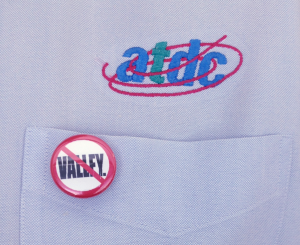 If you’ve seen me during business hours in the last five years, it’s likely that I was wearing a button like this one on my shirt or jacket. And if you asked me about it, it’s likely that I gave you one… I’ve given away over 1000 at this point.
If you’ve seen me during business hours in the last five years, it’s likely that I was wearing a button like this one on my shirt or jacket. And if you asked me about it, it’s likely that I gave you one… I’ve given away over 1000 at this point.
The image came to me literally in a dream, five years ago last month. I woke up, went downstairs, and created the image file before breakfast. By that weekend, my wife and I had run off the first 100 using a buttonmaker at the Georgia Tech Student Center. The next weekend, we made another hundred. Then we realized that buttonmaking was not our core competency, and I started outsourcing them from a sweatshop in China.
I blogged about it here, and even made the image part of my blog template.
And I’ve worn one pretty much every day since. It leads to a lot of different conversations. (And yes, I wear it when I travel, and I’ve worn it in Palo Alto. They got it.) Given five years of interactions, let me try and summarize the different messages:
We’re not Silicon Valley, and I’m OK with that.
Silicon Valley is different. (And, these days, I’d include metropolitan San Francisco, since more and more startups are launching in the city rather than the Valley proper.)
It’s not good, it’s not bad, but it’s different. You can build teams overnight. And you can see your team disappear overnight. You can raise ridiculous amounts of money (Uber). You can lose ridiculous amounts of money (Color). And, occasionally, you can sell your company for ridiculous amounts of money (Instagram). Good news travels quickly (Apple). So does bad news (Ellen Pao). You live in fear of missing the next big thing. And a lot of times, you are trapped in a very comfortable bubble, building products for your neighbors in the same bubble.
That’s not Atlanta.
Atlanta is about building real companies for real customers who generate real revenue. That may not get you coverage in TechCrunch, but it’ll make you very popular with your bank.
Don’t ask me “How do we make Atlanta the next Silicon Valley?”
We’re not going to.
We shouldn’t even try.
Silicon Valley has happened exactly once in the last century. (And its predecessor a century ago was arguably Detroit, which isn’t exactly a model to emulate right now.) It was a unique confluence of Cold War investment, timely scientific advancement, unbridled American optimism, favorable pension legislation, perfect weather, and a lot of luck.
And it has indisputably reached critical mass. So much so that the next Silicon Valley is, almost certainly, Silicon Valley. Heck, just to add insult to Detroit’s many injuries, Elon Musk is making cars there!
Every city in America, and literally hundreds more overseas, has claimed to be “the next Silicon Valley” at one time or another (1.6 million results on Google). I wish they’d all stop. Atlanta is a great city, and I’ve chosen to build my career here, but we’re not going to build Silicon Valley.
We can build a better Atlanta.
And that’s probably the most important message of my little button. Let’s not obsess over a geographical oddity that’s not terribly relevant to our world. Let’s obsess over identifying customer problems, solving them, and getting paid. And if we do that a little better this year than last year… and a little better next year than this year… and keep doing it year after year… then we can stop worrying about what Pando Daily thinks, and just cry ourselves to sleep on our huge bags of money.
We shouldn’t try to copy Silicon Valley.
There’s a secret that a lot of people don’t recognize about Silicon Valley startups: the successful ones create a lot of wealth, but they don’t create a lot of jobs. Instagram was an incredible success, but it employed twelve people. Twelve. Most of that billion-dollar exit went to a handful of venture firms who returned incredible capital gains to their limited partners (pension funds and such).
Here in Atlanta, AirWatch just got acquired for $1.5 billion, and yes, their investors scored incredible capital gains, too. But in getting to that exit, AirWatch hired 1,800 employees (most in Atlanta) to serve 12,000 customers around the world. All those 1,800 employees get paid every month. And their salaries get spent in Atlanta to buy cars and houses and yoga classes (and they pay a lot of taxes, too). I’d argue that a company like AirWatch has a much more substantial impact on the local economy than an Instagram, even though Instagram gets 400x as many returns on Google.
There’s a lot we can learn from Silicon Valley. There are great lessons to be absorbed from what has worked, and what hasn’t worked. I teach seminars on it. Let’s learn, and adapt that learning to our unique environment. But just trying to slavishly imitate the Valley leaves us like the poor Pacific Islanders, wondering why their cargo cult doesn’t make the airplanes come back.
You don’t have to move to Silicon Valley to be successful.
Finally, there’s a mindset among entrepreneurs that you have to move to Silicon Valley to be successful. Guy Kawasaki told us that at one of the very first TAG meetings in 1999. That’s where all the smart people are, the streets are paved with venture capital, and brilliant developers are hanging out on street corners waiting for you to recruit them. It’s the only place to build a successful company.
Nonsense.
As I’ve pointed out before, Atlanta has seen over $60 billion in technology company exits since the mid-1990s. That’s a whole lot of wealth creation. No, we haven’t had a Facebook, or a Google… but I’m not sure that we need to. With a steady drumbeat of $100 million acquisitions seemingly on a monthly basis, there’s clearly a lot of success happening here.
In fact, I’ve argued that in one particular view, Atlanta may be a better location for your startup than Silicon Valley… and that’s if you’re old enough to want to get married and have a nice house and a couple of kids and maybe a dog. Atlanta is where we build startups for grownups. And with the average entrepreneur in America being 40 years old, that’s not such a bad thing, is it?
As I wrote in my most popular blog post,
The median actor in Hollywood is a waiter. The median Silicon Valley entrepreneur is broke and disillusioned. If you’re 43 years old, and haven’t grabbed the brass ring of a multi-million dollar exit, and you’re still living in Mountain View in a million-dollar crackerbox… well, you’re just a darned fool.
Conclusion
Note what I’m not saying when I wear my button. I’m not saying that Silicon Valley is a bad place. Or that it’s full of bad people. Or that we’re somehow superior to them. We’re just different. And what happens there is largely irrelevant to what happens in our local technology ecosystem.
I wear my “Not the Valley” button to engage strangers with these thoughts. Ninety percent of the time, I get a big grin and “That’s exactly right! I knew that, but I hadn’t put it into words!” (And ten percent of the time, someone tells me later that I got described as “childish” or “negative” or “jealous,” but my skin is thick enough that I ignore those people.)
If I ever start getting reactions like “Well, duh!” or “Yeah, everybody knows that”… then I’ll stop wearing my button. Until then… if you want one, just ask. I usually have a pocketful to hand out.
And if you disagree, I’ll end this post as I ended the first one, five years ago:

Nice article. I like your comparison to Detroit’s past and the point on the median actors in these ecosystems. Recently, I wrote a book on this same topic called Startup Sacrilege (leanpub.com/StartupSacrilege).
Hey! Just wrote this, very very *VERY* much in line with your train of thoughts. Hope helpful!
http://venturebeat.com/2014/08/14/silicon-valley-has-evolved-its-not-about-startups-anymore/
Hi Stephen,
Excellent article on not being silicon valley. I believe the future of innovation doesn’t live in the valley but in hearts and minds of talented individuals elsewhere. We’ve seen the growth in NYC and Atlanta is also doing well as you pointed out.
On my first visit to Silicon Valley the thing that struck me was the ready availability of funding. In the area surrounding Stanford and Palo Alto it appeared that there was a VC office on every corner. I felt like there was a guy standing in the window looking through the blinds, check book in one hand with pen in the other, just waiting for the next dropout to come walking up the drive. It was startling.
People are led to believe the only place they can be really successful is in the valley. And if for some reason you are not there you are chopped liver. Having been flown out there, grilled and made it all the way to the end, only to be punted, you know, I pretty much felt like chopped liver.